| 41% CEOs
that agree with the government's decision to privatise only
loss making public sector firms |
Kamal Nath, a seven-time member of Parliament from Chhindwara in
Madhya Pradesh, wears his concern for Indian farmers and tribals
on his sleeve. However, the man has had a fling or two with international
trade policy, something that is now likely to take up much of his
time. As Textiles Minister, he was part of WTO talks on the Multi
Fibre Agreement (MFA) in 1996. Later, in 1999, he was part of a
delegation of parliamentarians that attended the Seattle Ministerial
Conference of WTO. "It will be my effort during all negotiations
that India's agri-centric interest is India-specific and not comparable
with G-20," he says, referring to the alliance of some 20 developing
countries including Mexico, Argentina and China that former Commerce
Minister Arun Jaitley helped forge during the Cancun round of WTO
talks in 2003. Still, the minister is aware that the G-20 wields
a bigger stick at WTO talks than India alone. "I will make
every effort to ensure G-20 survives," he quickly adds. By
the end of June, Nath hopes to present his ExIm policy that he promises
will focus on simplifying procedures and reducing transaction costs,
the twin bane of most Indian exporters.
|
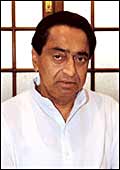 AGE:
57 AGE:
57
EDUCATION: B Com, St Xavier's,
Kolkata
BACKGROUND: Career politician
Minister of State for Environment and Forests (1991-95); Minister
of
Textiles (1995-96)
CEO RATING: 4.7
FOR IMMEDIATE ACTION
» Reduce
transaction costs to render Indian exports competitive
» Protect
India's interests at WTO
» Ensure
India signs more bilateral free trade agreements
REFORMIST CREDENTIALS
» Announced
new textile policy when he was minister to push exports
» Comes
from a business background
|
WHAT TO EXPECT
T.R. BAALU
Minister of Roads, Surface Transport, Highways and Shipping
T.R. Baalu is as astute as it gets. So, when the businessman-turned-politico
is asked about his reaction to the tonnage tax for the shipping
industry proposed by former Finance Minister Jaswant Singh, he cleverly
retorts, "As a businessman I will say yes, but as a minister
my answer will be guarded." Upgrading highway and rural road
infrastructure is on the minister's agenda, although he expects
the Ministry of Rural Development to chip in for the latter. As
for privatisation of Shipping Corporation of India, his answer should
please the communists. "I am not a mad man to privatise a profit-making
company."
|
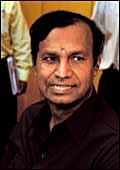 AGE:
62 AGE:
62
EDUCATION: BSc, New College,
Chennai; Civil engineering diploma from Central Polytechnic
BACKGROUND: Industrialist
Minister of State, Petroleum and Natural Gas (1996-98); Minister
of Environment and Forests (1999-2004)
CEO RATING: n.a.
FOR IMMEDIATE ACTION
» Continue
to press the pedal on the Golden Quadrilateral project
» Upgrade
the fleet of the Shipping Corporation of India and take a
call on its divestment
» Enhance
road network in rural areas
REFORMIST CREDENTIALS
» Is
speaking of private participation in the roads sector
» Comes
from a business background
» Is
open to private participation in ports
|
WHAT TO EXPECT
P.M. SAYEED
Minister of Power
| 66% CEOs
that feel it is time most services were brought under the tax
net |
Maybe it is his desire to be seen as market friendly that is preventing
P.M. Sayeed from scrapping National Thermal Power Corporation's
IPO (of 5 per cent of its equity) scheduled for August 2004. Several
tough calls await the minister: the fate of Dabhol and implementing
the Electricity Act of 2003 for starters. There's no doubt as to
where Sayeed's heart lies. "Extensive rural electrification
programmes will be put in place to provide access to electricity
to those households that do not have any," he says. That's
some 73 million households.
|
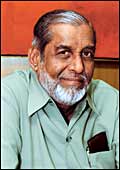 AGE:
63 AGE:
63
EDUCATION: BCom, Government
Arts College, Mangalore; degree in law from Mumbai University
BACKGROUND: Minister of
State, Coal, Steel, Mines (1979-80); Minister of State, Home
Affairs (1993-95); Minister of State, Information and Broadcasting
(1996-96)
CEO RATING: 3.9
FOR IMMEDIATE ACTION
» Ensure
that the spirit of the Electricity Act 2003 that the communist
parties want amended stays sacrosanct
» Restructure
bankrupt State Electricity Boards
» Remove
cross-subsidies in the power sector
REFORMIST CREDENTIALS
» His
track record in the ministry of steel (1979-80) and information
and broadcasting (1995-96) is unimpressive
» Hasn't
done much even for his own borough, Lakshadweep
|
WHAT TO EXPECT
MANI SHANKAR AIYAR
Minister of Petroleum & Natural Gas and Panchayati
Raj
Known for his quick repartee and his outstanding work in his constituency,
Mayiladuturai, Mani Shankar Aiyar occupies one of the hottest seats
in the UPA ministry. As this magazine goes to press, he is yet to
take a decision on hiking petrol and diesel prices, fixed in December
2003 when the international price of crude was $29 to the barrel
(it is now $41). There are other issues he has to address as well:
a new pipeline policy that helps companies pipe oil and gas over
existing networks, the appointment of a petroleum regulator, and
the phasing out of subsidies on LPG and kerosene. That's a bit.
|
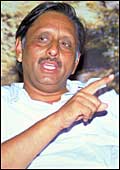 AGE:
63 AGE:
63
EDUCATION: BA, St Stephens,
Delhi; MA, Trinity Hall, Cambridge
BACKGROUND: IFS bureaucrat
turned politician
CEO RATING: 6.6
FOR IMMEDIATE ACTION
» Create
a petroleum regulation authority
» Deal
with a clutch of issues concerning market-pricing and cross
subsidies of petro products
» Finalise
the pipeline policy of the government
REFORMIST CREDENTIALS
» Has
written extensively about the importance of India integrating
with the global economy
» Refers
continually to late mentor Rajiv Gandhi's dream of ushering
India into the future
|
WHAT TO EXPECT
DAYANIDHI MARAN
Minister of Information Technology and Telecommunications
| 30% CEOs
that think the government will be able to keep the fiscal deficit
down to 4.9 per cent of GDP |
Dayanidhi Maran is, arguably, the most successful businessman who
holds a ministerial berth in this government. He cut his teeth running
Sumangali Cable Vision, the cable arm of the Sun cable network his
family owns (elder brother Kalanidhi is CEO). He has already released
a 10-point charter for his ministry detailing convergence, rural
teledensity, broadband, fourth generation technologies and a national
internet exchange as areas of focus. "The New Telecom Policy
of 1999 is outdated," he says. "The telecom sector urgently
needs a new policy." And from a national teledensity of 7.5
(phones per 100 people) now, Maran wants India to achieve a rural
teledensity of 15 in the next two years. That should be a challenge
for even a man who likes to be at the vanguard of technology (or
legislation; SCV was the first cable operation in the country to
go the Conditional Access System way).
|
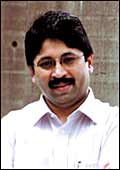 AGE:
37 AGE:
37
EDUCATION: BA, Loyola
College, Chennai; MBA from Harvard
BACKGROUND: Cable network
entrepreneur
CEO RATING: 6.6
FOR IMMEDIATE ACTION
» Farm
spectrum fairly between various types of telcos
» Enhance
teledensity in rural areas
» Increase
the ceiling on FDI in telecom to 74 per cent
REFORMIST CREDENTIALS
» Is
already talking of 74 per cent Foreign Direct Investment in
telecom
» Comes
from a business family (brother Kalanidhi runs the Sun network
of vernacular satellite channels)
» Like
late father Murasoli Maran, is a strong votary of multilateral
trade
|
WHAT TO EXPECT
PRAFUL PATEL
Minister of Civil Aviation
One would expect a bidi baron from maharashtra to be a votary
of open-market economics. Praful Patel is, and he isn't. He is not
averse to allowing Indian private carriers to fly to neighbouring
countries. Nor is he against the planned modernisation (by the private
sector) of Mumbai and Delhi airports. However, he is categorical
that Air India and Indian Airlines will not be privatised. "Simply
selling them is not a solution," he says, adding that their
fleet upgradation will happen.
|
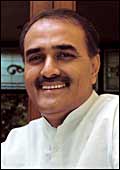 AGE:
47 AGE:
47
EDUCATION: B Com, Mumbai
BACKGROUND: Businessman
CEO RATING: 4.3
FOR IMMEDIATE ACTION
» Move
to an open skies policy
» Upgrade
the fleets of Indian Airlines and Air India
» Modernise
Delhi and Mumbai airports
REFORMIST CREDENTIALS
» Bidi
baron, ergo, talks business
» Not
averse to allowing private domestic airlines fly to neighbouring
countries
|
WHAT TO EXPECT
SIS RAM OLA
Minister for Labour and Employment
Labour is labour, inside the special economic zone or outside."
With those words, Sis Ram Ola reinforces this government's attitude
to labour reforms. The one-time farmer from Rajasthan's Jhunjhunu
district is keen to do something for the 373 million Indians employed
by the unorganised sector. More pressing, however, will be his role
in deciding on an equitable rate of interest for the Employee Provident
Fund, and his ability to implement the promise of a minimum of 100
days employment in public works programme for at least one adult
from under-privileged families.
|
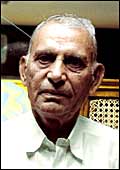 AGE:
76 AGE:
76
EDUCATION: High School
BACKGROUND: Agriculturist
MoS, Chemicals & Fertilisers (1996-97); MoS, Water Resources
(1997-98)
CEO RATING: n.a.
FOR IMMEDIATE ACTION
» Create
a flexible labour policy
» Address
the imbroglio around EPF rate
» Create
a security net for the unorganised sector
REFORMIST CREDENTIALS
» Comes
from a farming background
» His
articulated focus is to guarantee employment, especially in
the unorganised sector
|
WHAT TO EXPECT
SHARAD PAWAR
Minister for Agriculture, Food & Civil Supplies, and
Consumer Affairs & Public Distribution
| 52% CEOs
that expect subsidies to increase |
It wasn't that agriculture needed a sugar daddy in this government.
Yet, in Sharad Pawar, that's what it has got. The minister hasn't
given a thought to contract farming and privatisation of food grain
storage. What he has, is a more active and autonomous role for Indian
Council of Agricultural Research, doubling agricultural credit in
the next three years, and "improving per-hectare yield."
Only, Pawar's stated philosophy of "removing restrictions for
farmers, including (those on) cross-border movement of goods and
marketing" may run up against some internal dissent.
|
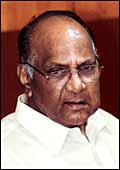 AGE:
63 AGE:
63
EDUCATION: High School
BACKGROUND: Agriculturist
CM of Maharashtra (1978-1980; 1988-1991; 1993-1995); Minister
of Defence (1991-93)
CEO RATING: n.a.
FOR IMMEDIATE ACTION
» Restart
the land-reforms process
» Introduce
agricultural reform and facilitate modernisation
» Amend
Essential Commodities Act to allow free movement of agricultural
produce
REFORMIST CREDENTIALS
» Made
pocket-borough Baramati investment friendly (especially for
Piaggio)
» Is
pushing for all restrictions on marketing agricultural produce
to be removed
» Is
pushing for all restrictions on marketing agricultural produce
to be removed
|
-Compiled by Ashish Gupta, Aditya
Wali, Sudarshana Banerjee and Alokesh Bhattacharyya
|
